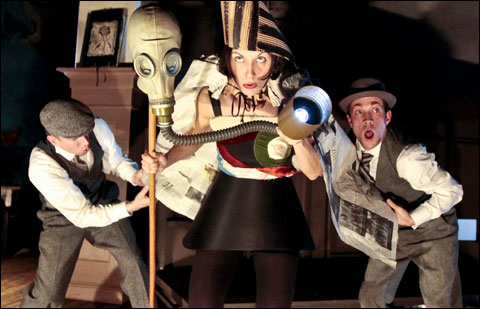
THE BLUE FLOWER: Despite the cultural-historical trappings, it’s the music and the production — not the story — that make this one bloom. |
The stem of The Blue Flower is its compelling score, an unusual mix of Weimar cabaret and country heartache onto which husband-and-wife creators Jim and Ruth Bauer have grafted a somewhat skeletal story that nonetheless encompasses the first half of the 20th century and then some. It comes as no surprise that the musical, 10 years in the making and given a gorgeously grungy sheen by the American Repertory Theatre (at the Loeb Drama Center through January 8), began as a song cycle. Nurtured by research, it has grown from that germ into a startlingly original amalgam of music, artwork, text, and videography in which the play is definitely not the thing. In fact, the play, a near-dialogue-less narrative suggested by the lives and times of German Expressionists Max Beckmann and Franz Marc, "dangerously unpredictable Dada girl" Hannah Höch, and Nobel-winning scientist Marie Curie, is pretty wispy. But for me that hardly mattered, given the emotive force of the music pushing the story — which, in turn, gives the score something to which to tie its billowing balloon of feeling.
In The Blue Flower, music being the food of love (and death), you don't need much more for the meal — and that's just as well, because the dramaturgical pickings are slim. Boy artist meets boy artist. Both fall in love with a beautiful female scientist. She loves the one who dies. The one who lives takes up with a freewheeling female Dadaist who performs a couple of very cool, alienation-happy cabaret numbers (one of them succinctly titled "Puke"). History ensues; so does jealousy in what is described as a "love rectangle" threading its way through the show.
Composer Jim Bauer is credited with the poetic lyrics, artist Ruth Bauer with the bones of a story suggested by the lives of Beckmann and Marc — the first of whom emigrated to New York and died of a heart attack in 1950, the latter of whom was killed in the Battle of Verdun. Here, "famous artist" Max Baumann is struck by a fatal coronary while finishing a book of collages on a Manhattan park bench in 1955 — after which his life, loves, and losses flash before him in an elegant jumble of "fairy tales," often as Max (who speaks only in a language of his own devising) hovers at the periphery, his expression one of sad impassivity. As the play unfolds between Max's life and death, we are carried back to the battlefields of the Great War, the Belle Époque that preceded it, the Weimar experiment that failed to undo its devastating damage, and even the Zurich cabaret where Dada was born.
So where does the blue flower come into it? Max explains at the top of act two (in one of the play's several lectures, this one delivered in the speaker's signature Maxperanto), that the German Romantic poets coined the image "to signify the ongoing search for artistic perfection," but that it came to symbolize reinvention and reincarnation — the opportunity to return and "do things a little less badly." Indeed, one of the themes of The Blue Flower is learning — or not learning — from the past.